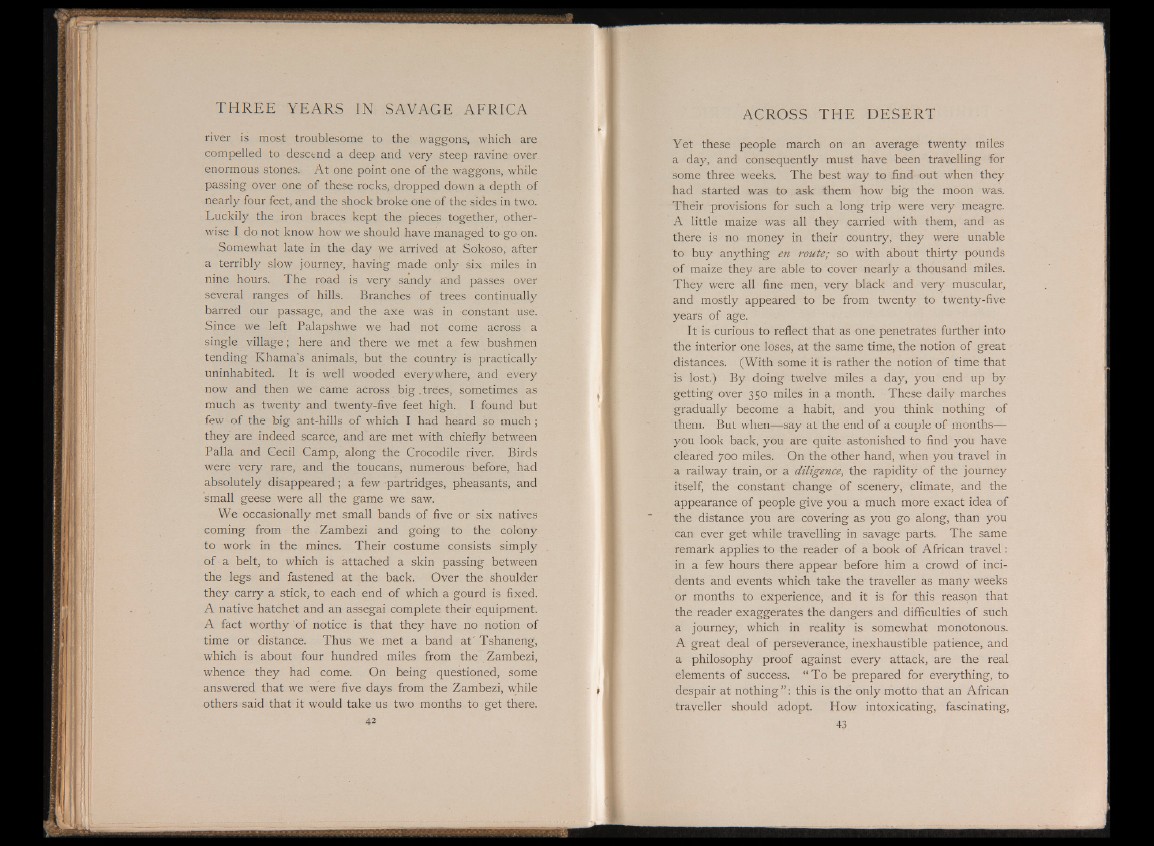
river is most troublesome to the waggons, which are
compelled to descend a deep and very steep ravine over
enormous stones. At one point one of the waggons, while
passing over one of these rocks, dropped down a depth of
nearly four feet, and the shock broke one of the sides in two.
Luckily the iron braces kept the pieces together, otherwise
I do not know how we should have managed to go on.
Somewhat late in the day we arrived at Sokoso, after
a terribly slow journey, having made only six miles in
nine hours. The road is very sandy and passes over
several ranges of hills. Branches of trees continually
barred our passage, and the axe was in constant use.
Since we left Palapshwe we had not come across a
single village; here and there we met a few bushmeri
tending Khama’s animals, but the country is practically
uninhabited. It is well wooded everywhere, and every
now and then we came across big .trees, sometimes as
much as twenty and twenty-five feet high. I found but
few of the big ant-hills of which I had heard so much ;
they are indeed scarce, and are met with chiefly between
Palla and Gecil Camp, along the Crocodile river. Birds
were very rare, and the toucans, numerous before, had
absolutely disappeared; a few partridges, pheasants, and
small geese were all the game we saw.
We occasionally met small bands of five or six natives
coming from the Zambezi and going to the colony
to work in the mines. Their costume consists simply
of a belt, to which is attached a skin passing between
the legs and fastened at the back. Over the shoulder
they carry a stick, to each end of which a gourd is fixed.
A native hatchet and an assegai complete their equipment.
A fact worthy of notice is that they have no notion of
time or distance. Thus we met a band at' Tshaneng,
which is about four hundred miles from the Zambezi,
whence they had come. On being questioned, some
answered that we were five days from the Zambezi, while
others said that it would take us two months to get there.
42
Yet these people march on an average twenty miles
a day, and consequently must have been travelling for
some three weeks. The best way to find out when they
had started was to ask them how big the moon was.
Their provisions for such a long trip were very meagre.
A little maize was all they carried with them, and as
there is no money in their country, they were unable
to buy anything en route; so with about thirty pounds
of maize they are able to cover nearly a thousand miles.
They were all fine men, very black and very muscular,
and mostly appeared to be from twenty to twenty-five
years of age.
It is curious to reflect that as one penetrates further into
the interior one loses, at the same time, the notion of great
distances. (With some it is rather the notion of time that
is lost.) By doing twelve miles a day, you end up by
getting over 350 miles in a month. These daily marches
gradually become a habit, and you think nothing of
them. But when:—say at the end of a couple of months—
you look back, you are quite astonished to find you have
cleared 700 miles. On the other hand, when you travel in
a railway train, or a diligence, the rapidity of the journey
itself, the constant change of scenery, climate, and the
appearance of people give you a much more exact idea of
the distance you are covering as you go along, than you
can ever get while travelling in savage parts. The same
remark applies to the reader of a book of African travel:
in a few hours there appear before him a crowd of incidents
and events which take the traveller as many weeks
or months to experience, and it is for this reason that
the reader exaggerates the dangers and difficulties of such
a journey, which in reality is somewhat monotonous.
A great deal of perseverance, inexhaustible patience, and
a philosophy proof against every attack, are the real
elements of success. “ To be prepared for everything, to
despair at nothing ” : this is the only motto that an African
traveller should adopt. How intoxicating, fascinating,